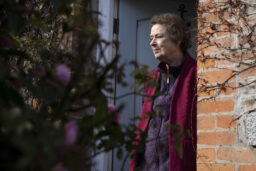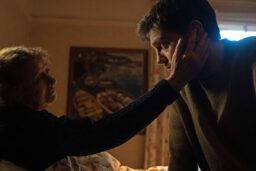Celebrating Joan Nancarrow
Joan Nancarrow, wife of Strike’s uncle Ted, could not be a greater contrast to her sister-in-law, Strike’s free-wheeling mother, Leda. Conventional, dependable and with deep ties to her home and community in St Mawes Cornwall, Joan provided a source of stability for Cormoran and his younger sister Lucy during their childhood, while Leda dragged them between squats, communes and boyfriends, and extremes of poverty and plenty.
Strike is visiting Joan and Ted after her diagnosis of advanced ovarian cancer when he meets Anna and the agency becomes involved in the cold case disappearance of Margot Bamborough (Troubled Blood). Joan does not live to see that case concluded, but during her illness Strike begins to deal with the contradictions of his childhood and appreciate the many gifts he has received from Joan’s steady presence in his life.
‘Strike is a Cornishman thanks to Joan and Ted’s home in St. Mawes and the time he has spent there.’
Community
Life with Leda, full of constant changes of residence and unstable characters, might have left Strike and Lucy without firm roots in the world, but Strike is a Cornishman thanks to Joan and Ted’s home in St Mawes and the time he has spent there. Joan was christened in the church, both she and Ted grew up there, and they returned to the pretty coastal town when Ted left the army. Now The Victory is Strike’s ‘local’, he drinks the Cornish beer DoomBar by preference even when he is in London, and feels a strong enough connection to the place to be ridiculously touched when Robin gives him a basket of Cornish specialities on his birthday during their investigations into the disappearance of Owen Quine (The Silkworm).
Strike also met some of his closest friends in St Mawes – Ilsa, whose mother was friends with Joan and who married Nick, a London school friend of Strike’s, and Dave Polworth, his friend and champion since his earliest visits to the town. Joan places an immense value on old ties and sees Strike’s decades long friendship with Dave as vindication of her decision to send him and Lucy to the local primary school against Leda’s wishes. Strike also, thanks to phone calls from Joan, knows the business and health of all their friends and neighbours, and they hear an awful lot about him. The ties might be too tight for Strike, but Joan’s funeral, with the church overflowing with friends and family, flowers she would have been delighted with, and friends ready to look after Ted, are a reminder of the community she loved and which was so much a part of her. The flowers Robin sends on behalf of the agency remind Strike he had built a community of his own too, with her and their work together in London.
‘Though Joan tried not to speak ill of Leda in front of [Strike], she was willing to go into battle with her for the sake of the children.’
Care
Strike was loyal to his mother, Leda, and is loyal to her memory. Whatever her faults, Strike knew Leda loved him, despite running through the money sent to her by Strike’s rockstar father in handouts and failed business ventures, and occasionally putting her children in danger. Although he does realise that surviving life with Leda might not have been possible without Joan and Ted in the background. Though Joan tried not to speak ill of Leda in front of him, she was willing to go into battle with her for the sake of the children. Strike remembers hearing them arguing downstairs when Leda deposited the children at St Mawes in mid-winter without coats. When they were living in a squat in Brixton, Ted and Joan managed to track them down and take the children out of another unsuitable living situation, and when Lucy could not bear living with Leda’s second husband, the deranged and sadistic Jeff Whittaker, she called Joan and she and Ted dropped everything to come and get them.
Joan and Ted never reported Leda to the child protection services, and she moved around too much for them to ever catch up with her, but they were a two person care service for Lucy and Strike – always more than willing to swoop in and offer safety and stability for the children. Even ill, Joan wants to provide for her family, constantly running herself ragged to provide food and endless cups of tea, this way of expressing her love too ingrained to change no matter the circumstances.
‘Joan was distraught when Strike gave up his history degree at Oxford to join the army’
Manners
Strike, to his sister and aunts’ distress, has followed an unconventional path in life. He is unmarried, without children and living in a flat above his detective agency, while Lucy has reacted against her upbringing by opting for a safe marriage, children and a life in the suburbs. As Ilsa tells Robin while they are investigating the murder of Edie Ledwell, (The Ink Black Heart) Joan ran a tight ship, it was all about manners and buttoned-up behaviour and not shaming the family. Strike thinks, with fondness, of how flustered she’d become if guests dropped round while the ironing-board was still out.
Joan was distraught when Strike gave up his history degree at Oxford to join the army, but his military life with its constant uprooting and challenges, mirrored what he had been used to with Leda and he thrived until his injury meant an end to active duty. Joan’s approach to life gave him insights into another world too – the pressures and pleasures of keeping up appearances, the craving for safety and an adherence to convention. It may not be the life Strike wants, but he often sees homes and people through his aunt’s eyes, and her influence has been as important as Leda’s.
Honesty
Strike struggles with Joan’s preference for comfortable social falsehoods, rather than uncomfortable truths. She has always insisted on a positive outlook, and for many years, she would assert that things were as they should be, despite any evidence to the contrary. She told Strike he was comfortable and not in pain after he was injured in Afghanistan, and years later tells him he slept well on the very uncomfortable sofa in the living room (Troubled Blood). During their last days together however, Strike sees a new Joan emerge. She asks open-ended questions and listens to his answers, and he realises Joan does recognise and appreciate his ability to face difficult realities too. It is Strike she talks to about her wishes for her funeral, knowing that Lucy and Ted couldn’t face the discussion, and trusting Strike to do what she asks of him. Her plans – a private cremation after a service at the church where she was christened, and her ashes scattered at sea so Ted and Lucy won’t feel obliged to visit and tend to a grave – are typical of Joan’s practical kindness.
‘Joan has always liked to show Strike off’
Pride
Joan has always liked to show Strike off, though Strike would find the carefully curated conversations about his career with her friends in St Mawes suffocating. After their more honest, open conversations during her illness though, Strike realises her pride in him is more profound and nuanced than he knew, and when she says she is proud of him in her final days, Strike can respond with love. When the case of Margot Bamborough is finally solved, he wishes he could tell her about it and hear her say she was proud of him one more time.
Love
Strike has worried that Leda, and his destructive, passionate long-running affair with Charlotte have made him unable to enjoy healthy relationships. The women he spends time with during his investigations always seem to ask something of him he can’t give, and his feelings for Robin are confused, but in Joan’s final days he finds he can value the love Joan and Ted have given him, without being disloyal to Leda and her generous heart. Ted, he tells Joan, is his Dad, and whatever the gypsy fortune teller told Joan when she was just married, Joan did have children, him and Lucy.
‘The care and love, the upbringing and understanding Joan provided for Strike have helped form him, and continue to form him even after she is gone.’




